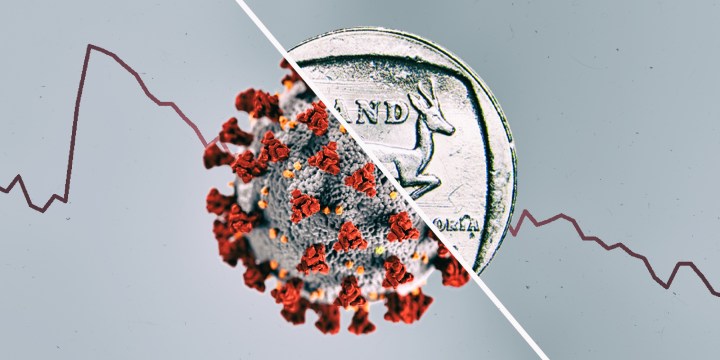BUSINESS MAVERICK
SA markets: Moody’s move was priced in, but pricing Covid-19 is impossible at this stage

Was the Moody’s downgrade already priced into South African markets? The direction that the rand, now near record lows, and bonds took during the month suggest this was the case. But no one knows how to price in the full impact of the Covid-19 pandemic.
For South African markets, March 2020 swept in like a lion and ended in lockdown.
The rand lost close to 16% of its value against the US dollar over the course of the month and on Monday, March 30, it went above 18 to the dollar for the first time – a record low. The elephant depicted on the R20 note is now almost on par with one US buck. This latest bout of weakness came after Moody’s downgraded South Africa’s credit rating to junk.
But since the downgrade, the rand has lost about 2%. So it was within spitting distance of its record low – physical distancing be dammed – when Moody’s pulled the trigger. Against the backdrop of all the other madness we have seen in March, that suggests the widely expected downgrade was “priced in” as they say, which means the event had been accounted for in advance and priced accordingly.
“The downgrade was mostly priced in and we had most of the losses before the downgrade,” Mike Schussler of economists.co.za told Business Maverick. “Vis a vis the downgrade, we have held up well.”
This can be seen in the bond market. The yield on the benchmark 10-year spiked 90 basis points after the downgrade to 12.52%, according to data on investing.com. By Tuesday afternoon, it was fetching around 11.0%.
The Moody’s downgrade may take a toll on South Africa’s already battered economy in the long run. South Africa’s debt will now be removed from the World Government Bond Index (WGBI), which will make it radioactive for many funds. That could see a sell-off of billions of dollars in South African government debt – estimates vary widely – which will push borrowing costs higher, at a time when borrowing requirements will also rise to compensate for tax revenue shortfalls in the face of a contracting economy.
The move has also triggered understandable anger. As Mark Heywood has noted: “Moody’s would have known that downgrading SA at this moment would place our government in even greater difficulty in confronting Covid-19 and hobble it in the reconstruction that must follow its aftermath. But they went ahead anyway.”
And South Africa has a far bigger worry at the moment, namely Covid-19. As Schussler notes: “No one knows how to price in a lockdown of the global economy.”
It has become a cliche to say these are “uncharted waters”, but that is the reality. Pricing in a rating downgrade is relatively easy because there are precedents and plausible scenarios, and even then, it is a bit of a thumbsuck. With Covid-19, there is simply no precedent to guide policymakers or markets. Many exceptional economists and analysts are crunching numbers, and attempting forecasts, but most won’t be worth the paper they were written on in a month’s time.
The only thing that can be said with any degree of certainty is that South Africa’s economy will experience a steep contraction, the people of the country will be poorer as a result and it is impossible at this stage to say when the economy will begin to really pull out of lockdown mode. South Africa’s trading partners and export markets are also in various stages of lockdown, greatly complicating matters.
South Africa can only hope that by the time this pandemic ebbs, it is not the leopard featured on the R200 note that is worth one US buck. BM
"Information pertaining to Covid-19, vaccines, how to control the spread of the virus and potential treatments is ever-changing. Under the South African Disaster Management Act Regulation 11(5)(c) it is prohibited to publish information through any medium with the intention to deceive people on government measures to address COVID-19. We are therefore disabling the comment section on this article in order to protect both the commenting member and ourselves from potential liability. Should you have additional information that you think we should know, please email [email protected]"


















 Become an Insider
Become an Insider